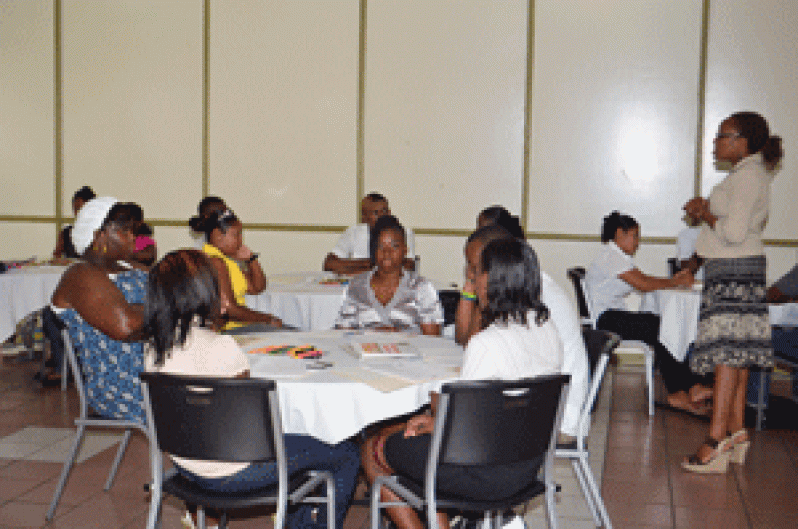USAID targets dropouts, other youths for special training
A TWO-DAY training course for community youth mappers began yesterday, under the United States Agency for International Development (USAID) Skills and Knowledge for Youth Employment (SKYE) project.  SKYE is a two-year initiative to strengthen youths access to justice and equip 800 at-risk in Regions 4 (Demerara/Mahaica), 6 (East Berbice/Corentyne), 9 (Upper Takutu/Upper Essequibo) and 10(Upper Demerara/Upper Berbice) with market-driven knowhow to transition to the workforce.
SKYE is a two-year initiative to strengthen youths access to justice and equip 800 at-risk in Regions 4 (Demerara/Mahaica), 6 (East Berbice/Corentyne), 9 (Upper Takutu/Upper Essequibo) and 10(Upper Demerara/Upper Berbice) with market-driven knowhow to transition to the workforce.
The scheme is funded by USAID through the Caribbean Basin Security Initiative (CBSI) and executed by the Education Development Centre (EDC), a US-based global training institution.
SKYE beneficiaries are school dropouts, other youths who completed formal education or training but do not have what is necessary to secure employment and more who are involved in the juvenile justice system and will work in the regions with them between the ages of 15 and 24 years.
The community youth mappers training activity is taking place at Regency Hotel, in Hadfield Street, Georgetown, with 20 participants from the four regions seeking to:
* strengthen capacity and provide skills and exposure to complete relatively complex tasks from start to finish in a professional manner;
* work as a team and taking direction/guidance;
* improve communication and inter-personal skills, in terms of interviewing local organisations and
* improve analytical skills, such as providing feedback on findings and suggesting appropriate changes to the methodology and survey instruments.
Target Regions
The actual mapping of the communities will take place from May 28 to 30, in the target regions. At the end of that process, those involved will emerge with relevant information on a sufficient sample and cross-section of organisations and government agencies in each of the target communities, which can provide effective support to SKYE participants (at-risk Guyanese youths) and the project more broadly.
Types of support include relevant job placement and internship opportunities, mentoring, technical and life skills training and counseling support and, for each community, relevant organisations to be surveyed include private sector companies; non-governmental organisations (NGOs) that provide support in terms of training, counseling etc; training providers and local government agencies.
Chief of Party of the SKYE Project, Mr. Kevin Corbin told the Guyana Chronicle they were requested to embark on this by USAID in Guyana and the Government of Guyana, to specifically target at risk youths of ages ranging from 15 to 24 years, and, as such, an assessment was conducted here by EDC, looking at issues relating to the target group in the population.
He said the undertaking also falls within a U.S. Presidential initiative, as President Barack Obama wanted to look at providing a sense of security within the Caribbean Basin.
“What we found is that there are some wonderful opportunities in Guyana, there are many training opportunities for youths, so youths get access through the Board of Industrial Training, through technical institutes and some donors and NGOs to get technical and vocational education training – but what we found is that there is a brief gap in linking youths from those trainings to employment,” he explained.
Corbin said that is a challenge being faced and it can be very difficult for youths, noting that it is a tough environment, even, globally.
He said, through the project, they will help to provide coaching and bridge youths from that technical training to employment and re-engagement in their communities.
Corbin said they are working with different types of youths, including some in detention centres, such as Sophia Juvenile Holding Centre, the New Opportunity Corps (NOC) and others who are out of school in communities.
Providing alternatives
“Any opportunity we can use, within existing policies in Guyana, to prevent them from going in the juvenile justice system is what we want to do,” he said, adding that, as such, they are working with the juvenile justice system and magistrates to utilise existing policies for providing alternatives.
“If youths can go into a project like ours, where they get work preparedness training, they get links to employment, if they can be diverted to our programme or to other existing programmes instead of going into a detention centre, that’s what we want,” Corbin expounded.
He said they have coaches working with youths in detention centres to help them see what direction they want to take, whether it is employment or pursuing education opportunities.
Corbin said they will make sure youths get links to counseling to deal with issues affecting them and, if necessary, some remedial education and engagement in work preparedness training.
“We have coaches who will be out in the regions ready to receive youths who are coming from detention centres, so they don’t have a gap. So, if they leave a place, they immediately get to the community and there is a coach there to welcome them home,” he pointed out.
Corbin said there is also an entrepreneurship training through the Guyana Youth Business Trust to help youths who are desirous of pursuing their own course, identify successful business plans and link them to micro-financing opportunities through the Institute of Private Enterprise Development (IPED).
“We will be there through the life of the project to support them in ensuring that they get linked to employment and that, once they get that employment, they stay employed,” he assured.
Corbin said the CBSI has several projects but maintained: “There is nothing that is quite like this, because this is catered specifically to Guyana.”



.jpg)











